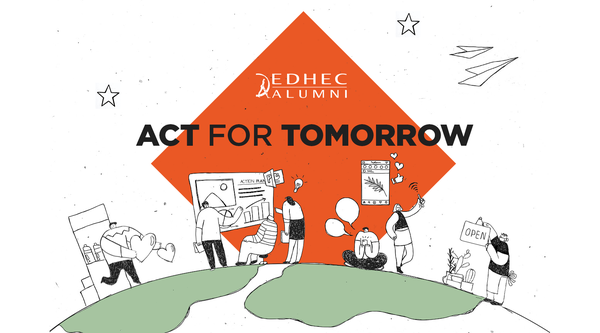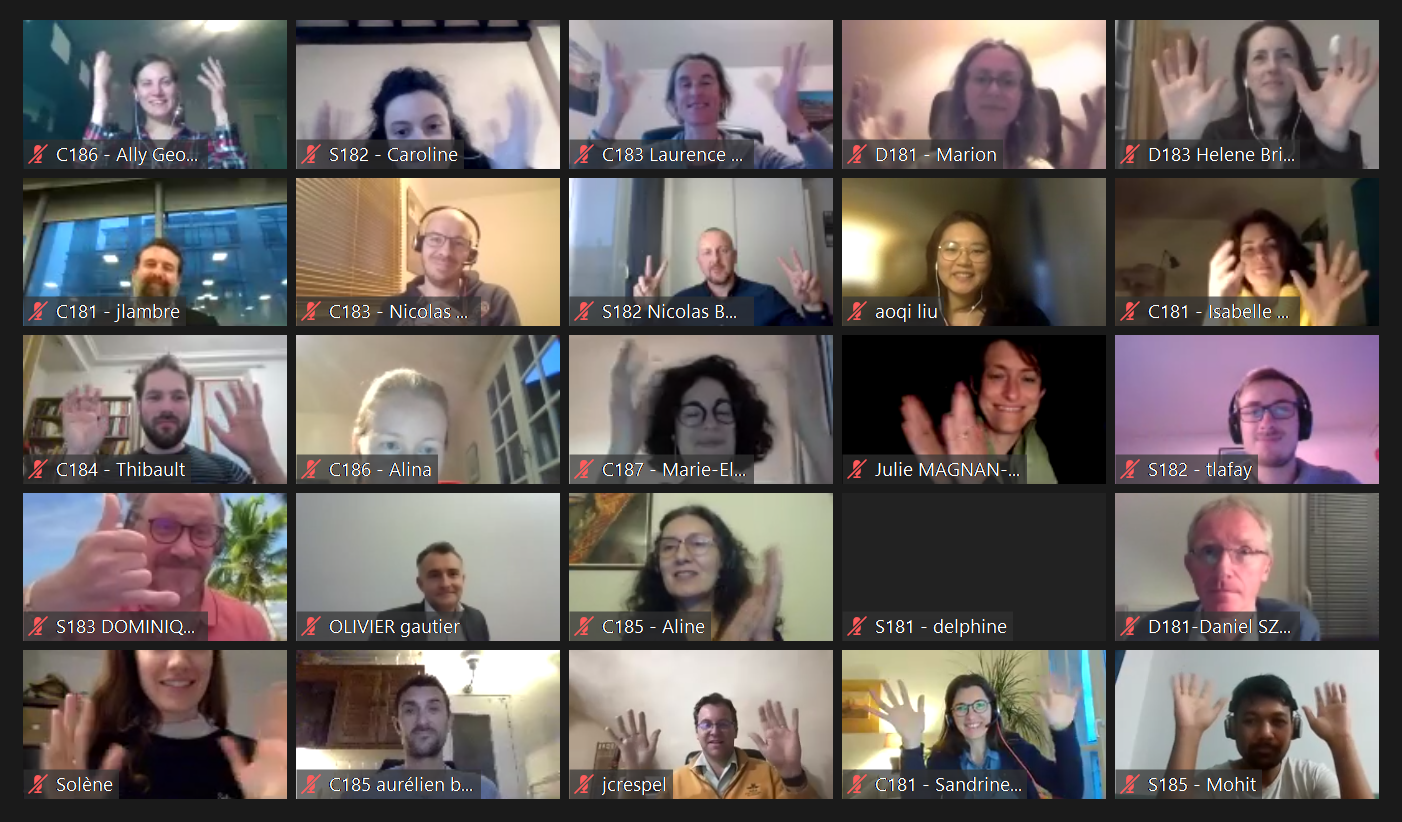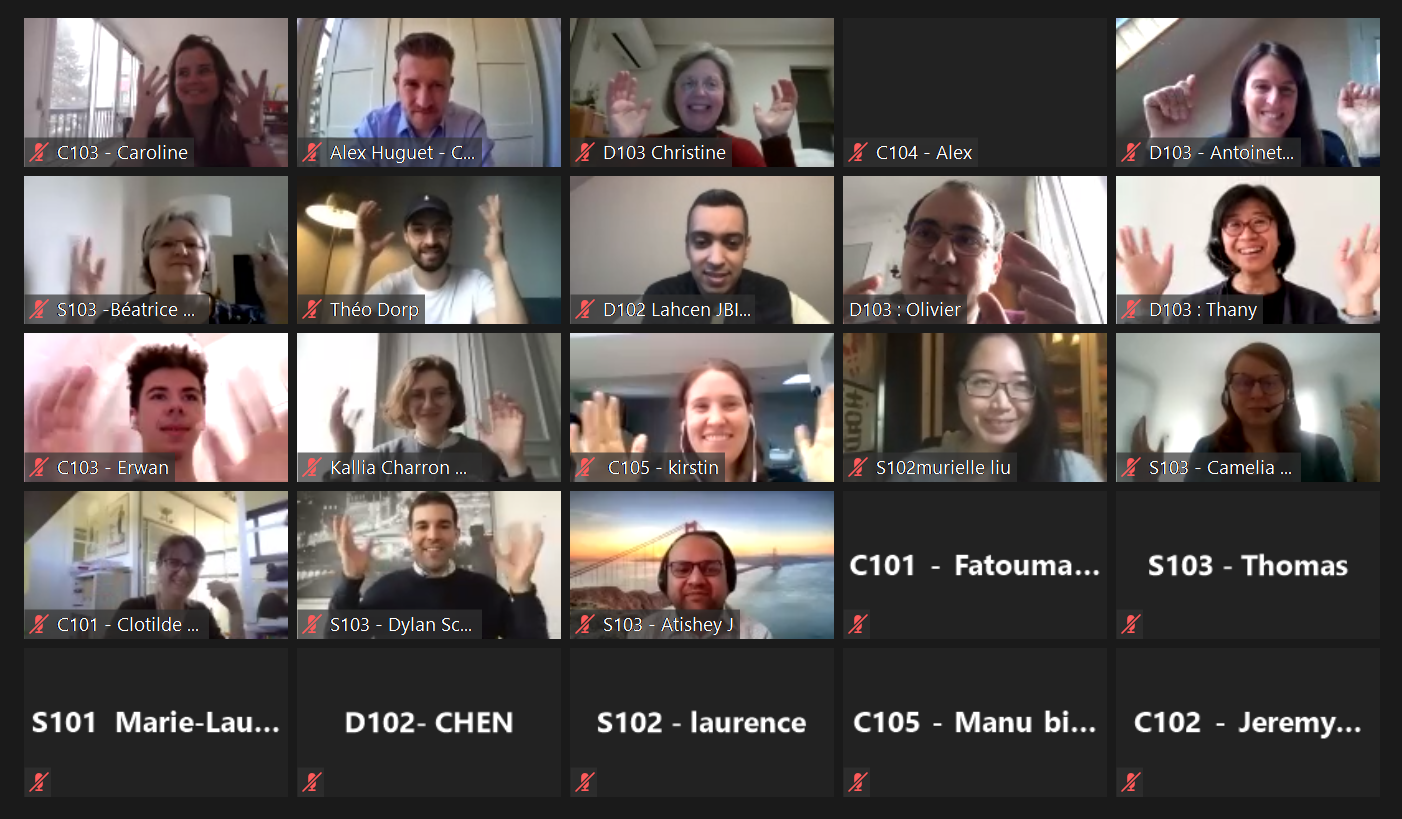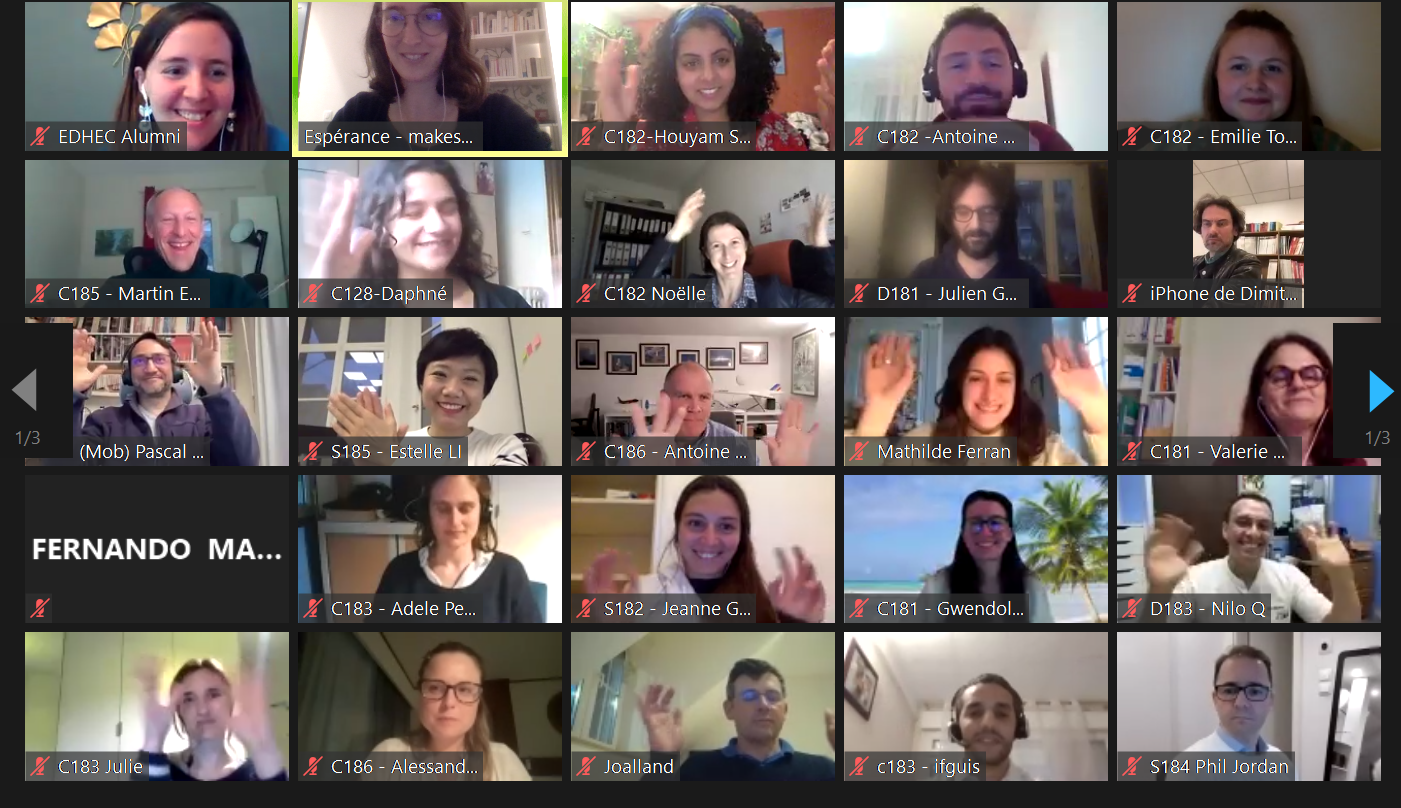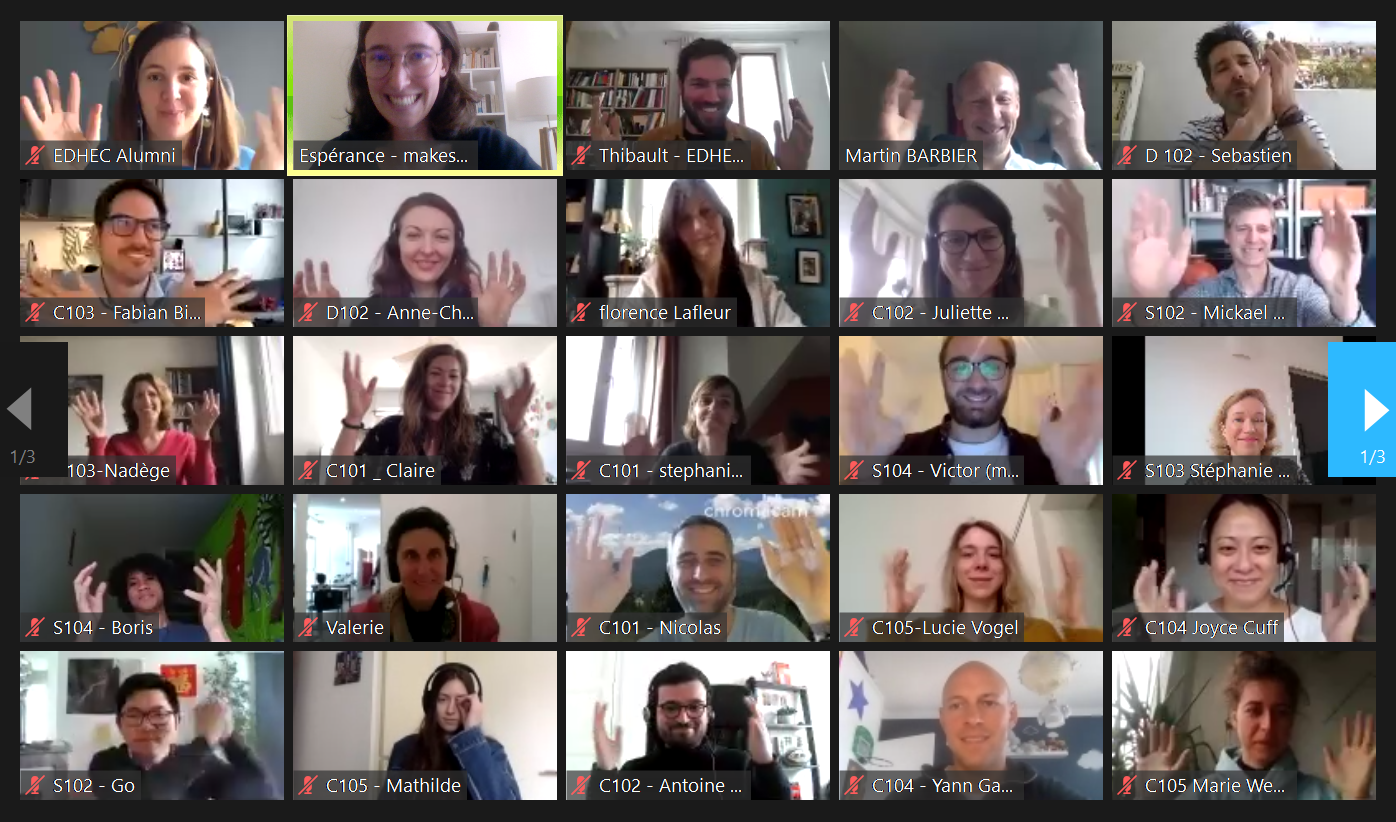"EDHEC Alumni Act for Tomorrow", the network in action for a positive impact
The "EDHEC Alumni Act for Tomorrow" programme took place from 2 to 16 March, following many untrodden paths! Here’s a look back at collective intelligence in action …
The programme’s beginnings
Up to now, ambassadors from the EDHEC Alumni network (volunteer coordinators of international, professional, sports & leisure clubs, company groups, programmes and class reunions) all around the world used to meet up once a year in Paris to prepare their roadmap for the 12 months ahead. In 2021, to reflect EDHEC Business School’s 2020–2025 strategic plan “Impact Future Generations”, this get-together became a collaborative online event lasting two weeks and involving all students and graduates from the EDHEC Alumni community. What could be more natural than to give all the EDHEC generations, wherever they may be in the world, the chance to engage in a dialogue to address their expectations?
The fundamentals of "EDHEC Alumni Act for Tomorrow"
The challenge would be no mean feat: to reinvent EDHEC Alumni based on the ideas of members willing to get involved, with a view to building a network of even greater solidarity and in step with contemporary environmental and societal issues. Rather than top-down initiatives, the principle was to tease out projects for and by alumni. EDHEC Alumni club ambassadors were not only able to communicate amongst themselves, but also with other members of the network not affiliated to clubs, so as to broaden both the debate and minds.
The format involved two online workshops in small groups, lasting 2 and 1.5 hours respectively (with two different timeslots to cover most of the world’s time zones), connected via WhatsApp discussion threads. Registered participants chose from three topics – SHARE (create the event of the future), CARE (care for the planet and mankind) and DARE (act for the network), reflecting the new pillars of EDHEC Alumni – before joining their team, moderated by an ambassador or EDHEC Alumni trustee. Each with a different EDHEC experience, participants brought their personalities to the table so together they could take a step towards change, one that could be supported by students and graduates alike.
In the shoes of one participant
In late February I met the team I’d be working with on my chosen topic. Thanks to the inspirational emails received in advance, I was able to get a handle on what we’d be doing but I was curious to see how the workshop would unfold and with whom.
2 March – 1st workshop: I didn’t know the other participants, there were six alumni in total, all from very different cultures, courses and backgrounds. Our only common ground was that we were all from EDHEC and had chosen the same topic, as well as working on an area that meant a lot to us (indicated in a questionnaire prior to the event).
“A way to discover the network’s full potential”
At the first workshop on 2 March, things got off to a tentative start. It was a leap into the unknown. But our mobiliser was there to help us get to know one another, enter into a discussion and guide the process of reflection during the session. All the participants introduced themselves, which allowed us to learn about each other, and the atmosphere was already more relaxed!
The time went by very quickly as we tackled the subject in earnest. We focused on one of the UN’s 17 sustainable development goals. Tongues gradually loosened and we discussed the initiatives we wanted to propose, debating and defending our own convictions. Collective intelligence, non-judgemental listening and a growing awareness of our shared problems allowed the team to sketch out some early initiatives.
We now had a canvas to guide our process of reflection and bring our ideas together. We tried to pad it out as we went along: it told us when to be ambitious with our ideas (brainstorming) and when to be more pragmatic, and made sure we were all on the same wavelength. We took notes, deleted some, corrected others ... and moved forward!
“I could see that others from EDHEC were committed to a social and environmental approach”
Two hours later the workshop ended. We were almost frustrated to have to stop what we were doing, as we knew that we were onto something with potential, but more work was needed before we could pitch our project two weeks later!
Between 2 and 16 March: I received two new inspirational emails and took part in my team’s WhatsApp discussion. During my free time, I didn’t really want to suggest ideas that would make our initial project more complex, but as each day unfolded I reflected on the topic we were addressing.
16 March – 2nd workshop: We all had a solid understanding of our subject, and the time had come to make it tangible with a 90-second pitch to the other participants. We had some more time to complete the ideas we came up with during the first workshop. The mobiliser put the decisions we had taken at the last session back into context, the clock was ticking and we had to make up our minds about an innovative initiative!
“Deploying the group’s energy in a limited timeframe”
Developing a sales pitch involves a range of emotions: outlining the problem is undoubtedly the most difficult exercise as it’s the first stage, the initial contact with the audience. The key figures need to speak volumes; the tension should be at its most acute. Then, the solution proposed should be a feasible and concrete response to the challenges outlined. But what we experienced in that limited timeframe was just what we needed to share our rush of adrenaline with the other teams! We had to agree on the person who would pitch the project, in the language of their choice. It was up to me!
In the shoes of a mobiliser
One week before the first workshop, I attended an online training course on facilitating group work, depending on my chosen topic. I then received a personalised email with the phone numbers of my team members and a detailed programme (minute by minute) for the two workshops. The preparatory work took some time, but I felt my actions were meaningful during the first workshop. I began that session with doubts about my ability to bring the group together or tease out new ideas. I left feeling invigorated and driven by so many positive exchanges!
“Motivation and many ideas, a fantastic exercise! The participants were super effective when it came to dividing up the different roles, limiting themselves to the essential and structuring the final idea.
In short, it was about knowing how to trust others”
As well as setting up a WhatsApp group for my team, I was also involved in another WhatsApp discussion thread with all of the mobilisers and organisers of the EDHEC Alumni Act for Tomorrow programme. It was very useful in case there were questions or if I needed any tips. A few messages was all it took to motivate me!
“I met fantastic alumni from many different backgrounds as part of our collaboration”
For the second workshop, I pursued the work we had begun in the first. Because the participants knew each other by now, we were able to pick up exactly where we had left off. The work gathered pace and I asked our volunteer scribe to fill in our shared canvas, which was the basis for our work. Our group joined all the other participants and mobilisers for that timeslot, and the pitches could begin!
Projects: user manual
This collective intelligence led to a total of 25 projects. The SHARE topic focused on making available the various areas of expertise of network members. CARE was about involving alumni in initiatives that closely reflect their convictions. As for DARE, what emerged was the idea of reinventing ways to get involved with EDHEC Alumni. The pitches that get the most votes from "EDHEC Alumni Act for Tomorrow" participants and mobilisers will be supported by our community of students and graduates. Watch this space where they will soon be unveiled!

Image gallery4
Comments0
Please log in to see or add a comment
Suggested Articles

